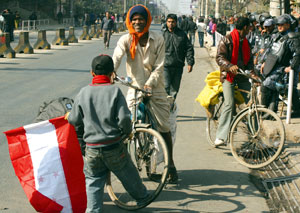 ANURAG ACHARYA |
Over 200 people stranded at Biratnagar airport last Saturday due to poor visibility were in for more bad news. Criminalised politics had led to another violent death in a Bharatpur jail and an enraged youth wing pressurised the parent party to call for a nationwide strike. Only this time it was supposedly the 'most democratic' party, the Nepali Congress.
The 85-year-old woman next to me wanted to call her son, who had returned to Dharan after dropping her at the airport. The elderly, the sick, tourists and doctors, we were all stranded, frantically calling to find out what was happening. Some were even hoping the flights would be cancelled because they didn't want to reach Kathmandu after dark with no transportation.
Luckily, the strike was called off just as the fog lifted. But that was only the warm-up. Two days later, the NC called for a 'real' strike and the country ground to a halt again. Congress leaders told the media it was their 'democratic right' to protest and that they would do so in a 'Gandhian' way without resorting to violence. But a terrorised population wasn't daring to venture out or open shops after taxis were torched, ambulances vandalsied and even bicyclists harassed. Government offices in several districts were ransacked, examination centers were mobbed, pharmacies stoned and Bharatpur airport attacked.
It was a 'succesful' banda because by Monday evening, the government took back all the cases against the NC activists in jail and promised to declare Shiva Poudel a 'martyr'. Paudel and his supporters were serving time in a Bharatpur jail for the alleged murder of a UML youth leader Sanjay Lama. Whether Paudel was innocent or a criminal, we will never know and it does not matter anymore.
It has now become impossible to distinguish between a criminal and a politician. In July in Biratnagar, the UML's Mahesh Basnet issued an open threat to a police officer and a newspaper editor for daring to accuse one of his supporters of trying to kill a reporter. Protected by the UML Basnet challenged the entire state machinery to arrest the attacker from his house, nobody dared.
This has now become a country where the home minister admits he hires goons to run his affairs, and says, "Oh, I am only doing what everyone else does." Parties mobilise their militant youth brigades to extort money from businesses and hijack government tenders. Media houses are vandalised, journalists manhandled, sometimes killed for speaking up.
We ran into long-staying American, Barbara Adams, on Monday walking past burning tyres on Putali Sadak. With her long white tresses, she stood out in the crowd of pedestrians. She just shook her head, "Kasto thiyo kasto bhayo yo desh."
A banda terrorises the public with the threat of violence, and has become the time-tested way for anyone to blackmail the state, and it doesn't even have to be a political party anymore. Anyone can do it. The protracted transition and stagnant economy means young people have no jobs, and a sizable population of youth is left outside the national mainstream. Disillusioned and hopeless, they vent their anger on the streets, and all political parties are trying to channel this energy to their advantage. It doesn't matter anymore whose flags they carry.
Outside the CA building in New baneswor, a 10-year-old was burning tyres and stoning cars. "Somebody gave me this flag and told me not to allow anybody to pass, so that is what I am doing," he told me proudly. An NC flag waver further down the street was telling a tv reporter: "This is the first time we have called a banda in three years, we will show other parties how bandas should be done."
Nepal has deeper structural problems eating away at the roots of democracy, and those who have bestowed upon themselves the task of defending it are the ones responsible for the rot.
Read also:
Up in smoke



